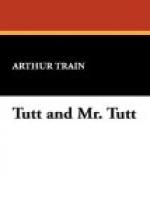However, when the assistant district attorney opened the People’s case to the jury Mr. Hepplewhite began to feel much more at ease. Indeed O’Brien made it very plain that the defendant had been guilty of a very grievous—he pronounced it “gree-vious”—offense in forcing his way into another man’s private house. It might or might not be burglary—that would depend upon the testimony—but in any event it was a criminal, illegal entry and he should ask for a conviction. A man’s house was his castle and—to quote from that most famous of orators and statesmen—Edmund Burke—“the wind might enter, the rain might enter, but the King of England might not enter!” Thus Schmidt could not enter the house of Hepplewhite without making himself amenable to the law.
Hepplewhite was filled with admiration for Mr. O’Brien, and his drooping spirits reared their wilted heads as the prosecutor called Bibby to the stand and elicited from him the salient features of the case. The jury was vastly interested in the butler personally, as well as his account rendered in the choicest cockney of how he had discovered Schmidt in his master’s bed. O’Brien bowed to Mr. Tutt and told him that he might cross-examine.
And then it was that Mr. Hepplewhite discovered why he had been haunted by that mysterious feeling of guilt; for by some occult and subtle method of suggestion on the part of Mr. Tutt, the case, instead of being a trial of Schmidt, resolved itself into an attack upon Mr. Hepplewhite and his retainers and upon the corrupt minions of the law who had violated every principle of justice, decency and morality in order to accomplish the unscrupulous purposes of a merciless aristocrat—meaning him. With biting sarcasm, Mr. Tutt forced from the writhing Bibby the admission that the prisoner was sound asleep in the pink silk fastnesses of the Bouguereau Room when he was discovered that he made no attempt to escape, that he did not assault anybody and that he had appeared comatose from exhaustion; that there was no sign of a break anywhere, and that the pair of opera glasses “worth five dollars apiece”—Tutt invited the court’s attention to this ingenuous phraseology of Mr. Caput Magnus, as a literary curiosity—were a figment of the imagination.
In a word Mr. Tutt rolled Bibby up and threw him away, while his master shuddered at the open disclosure of his trusted major-domo’s vulgarity, mendacity and general lack of sportsmanship. Somehow all at once the case began to break up and go all to pot. The jury got laughing at Bibby, the footmen and the cops as Mr. Tutt painted for their edification the scene following the arrival of Mrs. Witherspoon, when Schmidt was discovered asleep, as Mr. Tutt put it, like Goldilocks in the Little, Small, Wee Bear’s bed.
Stocking was the next witness, and he fared no better than had Bibby. O’Brien, catching the judge’s eye, made a wry face and imperceptibly lowered his left lid—on the side away from the jury, thus officially indicating that, of course, the case was a lemon but that there was nothing that could be done except to try it out to the bitter end.




